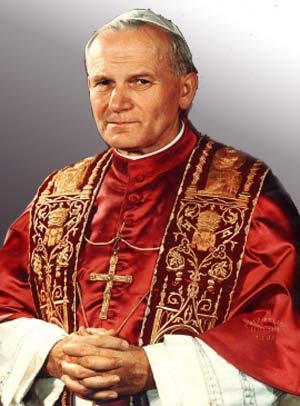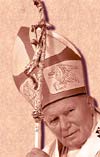 |
Remembering Pope John Paul
Pope John Paul II Origin:
Born in Wadowice in Poland, on May 18, 1920, Karol Josef Wojtyla was the son of a retired army officer and a school teacher. Having lost his mother and brother at a tender age, Wojtyla was raised by his father. With a passion for poetry, religion and theater, Wojtyla enrolled at the Faculty of Philosophy at Jagellonian University in 1938. He founded an underground Theater company. He wrote and acted in plays and was part of literary discussions and poetry sessions. In 1941, Wojtyla's father died, with the unfulfilled desire to see his son commit himself to God's service. But he soon began studying clandestinely at an underground seminary, at a time when Nazis were actively persecuting priests who opposed them.
Wojtyla was ordained as a priest in 1946. He earned doctorates in theology and philosophy before he became an assistant pastor in 1949 in Krakow. Though the town was predominantly Catholic, there were some Jews too. Wojtyla's childhood friend Kluger would later play a crucial role when the Vatican extended diplomatic recognition to Israel. Wojtyla was ordained Bishop in the Cathedral of Wavel in Poland in 1958 and was named a cardinal in 1967 by Pope Paul VI. In 1977 he was elected to the Council of the Secretary General of the Synod of Bishops and in 1978 he was elected Pope on the death of Pope John Paul I.
Pope John Paul II Papacy:
As the first Pope who was non-Italian, Pope John Paul revolutionized the papacy from its earlier stance of being unapproachable and infallible. He upheld the long-standing traditions of the Catholic Church and held the Papal post at a crucial point in world history. When he ascended the Holy See, the world was locked in a cold war with the possibility of a nuclear holocaust. When he passed away in 2005, he leaves behind a unipolar world still at strife - but the scourge of totalitarianism and communism from the Eastern Block faded out. History will attribute the fall of Soviet Union and the disintegration of the former Eastern Block countries to Pope John Paul II in a way.
US President George W Bush, in his condolence message said - "Catholics have lost their Shepherd. The world has lost a courageous leader and a great champion of freedom." Millions braved the elements to get a glimpse of the departed Pope in the desolate days following his passing away. The world has never seen a funeral ceremony attended by so many in all these years. Pope John Paul II is a Pope of the masses and a Pope of the Young. His humanity, love of children and tireless efforts to bring the Catholic message to as wide an audience as possible marked him as one of the dominant and most respected figures of the 20th century and early 21st century.
Pope John Paul II took an uncompromising stand against the communist regime in his native Poland as elsewhere. He made a couple of visits to Poland, defying the martial law of the regime. He goaded the people there 'not to be afraid'. He survived an assassination attempt in 1981 when he was shot at by Mehmed Ali Agca at close range. He was the first Pope to visit a synagogue. In 1986 he prayed with Rabbi Elio Toaff in a Roman synagogue. In 1993, he signed a deal that established diplomatic relations between the Holy See and Israel. He made an unprecedented public statement in 2000 seeking forgiveness for the sins and faults committed or condoned by the Church in its history spanning 2,000 years.
Pope John Paul's historical visit to Syria in 2001 was a landmark step in attempting a peace process in the Middle East. He became the first pontiff to enter a mosque. While the Pope defended womens' rights to equal dignity, he highlighted that women were different from men and the diversity of their roles within the Church and the family. When he died on April 2 2005, Pope John Paul II became the longest serving pope of this century.
Pope John Paul II's Encyclicals
Redemptor Hominis (The Redeemer of Man) - This encyclical delves into the situation of a redeemed person in today's times of scientific and technological breakthrough. It discusses the role of theologians and priestly celibacy.
Dives in Misericordia (Rich in Mercy) - This encyclical looks at the special role of the message of Christ in these troubled times. There is special emphasis on the need for mercy, which construes a vital role in the message of the Lord.
Laborem Exercens (On Human Work) - This social encyclical takes a look at the role of work in any economic system. It reiterates the need to focus on the dignity and rights of the workers.
Slavorum Apostoli (The Apostles of the Slavs) - Pope John Paul II celebrates and honors St. Cyril and St. Methodius who were instrumental in bringing the Gospel to the Slavic nations of erstwhile Eastern European Block.
Dominum et Vivificantem (On the Holy Spirit in the Life of the Church and the World) - Through this encyclical, Pope John Paul II cites materialism and its consequences on the contemporary world.
Redemptoris Mater (The Mother of the Redeemer) - This encyclical looks at the role of Blessed Mother as a model of Faith.
Sollicitudo Rei Socialis (The Social Concern of the Church) - The seventh encyclical draws attention to the condition of the widening chasm between the rich and the poor and its social repercussions.
Redemptoris Missio (The Mission of Christ the Redeemer) - Pope John Paul II has brought focus on the permanent validity of the message of Christ and the urgency for missionary evangelization.
Centesimus Annus (On the Hundredth Anniversary of Rerum Novarum) - This encyclical comes on the heels of the breakdown of Eastern Europe. Pope John Paul II has examined the strengths and weakness of the free market economy.
Veritatis Splendor (The Splendor of Truth) - The tenth encyclical reaffirms the universality of moral commandments that hold relevance in this age too.
Evangelium Vitae (The Gospel of Life) - This encyclical takes a hard look at laws that legitimize abortion and euthanasia. It declares them to be grave moral disorders and disturbing symptoms.
Ut Unum Sint (On Commitment to Ecumenism) - A discussion on the role of the Pope as a guarantor of unity, this encyclical discusses ecumenism's history as well as ecumenical translations of the Bible.
Fides et Ratio (Faith and Reason) - The relationship between faith and philosophy is examined. This encyclical also examines the relationship between metaphysics and theology and God's word in a scientific world.
Ecclesia De Eucharistia (On the Eucharist in its Relationship to the Church) - A commemoration of the institute of the Eucharist, which is at the center of Christ's sacrifice on the cross and rising from the dead. Pope John Paul also offers a meditation on Mary as woman of the Eucharist.
|



